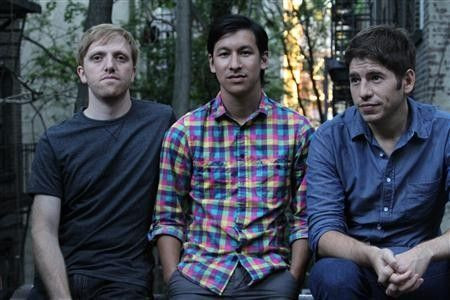Kickstarter making noise with crowd-funding

Perry Chen was working in the New Orleans' music industry when he faced a cash-crunch during the city's JazzFest. He wanted to bring a European musician to perform at the festival but couldn't raise the money. A decade later, other artists are now reaping the benefits of Chen's brainstorm: online fundraising site Kickstarter.
It worked for filmmaker Gary Hustwit, who turned to the popular site to help fund his latest documentary film, betting the promise of a new movie was powerful enough to attract financial support from a broad range of online backers.
"It's a great platform, a really intuitive system for producers and backers," said Hustwit, who presold DVDs, downloads of the film and other incentives in exchange for pledges of $35 to more than $5,000, fulfilling the final piece of a total budget of roughly $300,000. "We needed that little extra kick to finish it up."
Kickstarter, cofounded with music journalist Yancey Strickler and Web designer Charles Adler, harnesses the power of the Internet to let artists like Hustwit showcase their projects online, setting a timeframe for reaching specific monetary goals in return for a piece of the action.
The site has been hugely successful, to date raising more than $75 million from 750,000 backers of some 26,000 projects. They are as varied as The Oona, a stand for smart phones, and Reverence, a multimedia photography exhibit focused on insects.
The business didn't go live until April 2009 but has since obtained undisclosed venture funding led by Union Square Ventures, a New York VC firm headed by influential investor Fred Wilson, who also supported such iconic ventures such as Twitter and Foursquare. Wilson didn't respond to a request for comment.
"Every project is raising a little economy around the work," said Strickler, 32. Kickstarter does not support charities and has a simple revenue formula that takes 5 percent of proceeds from successful campaigns.
"They're saying, these are the things I have to offer, here's what the prices are, and if enough people get behind this, this thing will happen," he said.
Strickler described the "all or nothing" model as good for both sides of the funding equation. Artists get a sense of whether their ideas are viable, preventing wasted time and resources; backers have the comfort of knowing they are joining a larger constituency. The suggested time frame for a campaign is 30 days.
"I think it creates a game aspect for sure," said Strickler, noting there are frequently exciting finishes to campaigns as deadlines approach. "You can follow along."
"The amount of money a project can raise is reflective of the relationship the creator has with his audience," he said, adding that proactive promotion of the project with tools like social media is important to success.
For-profit ventures can participate, as long as their submissions qualify as creative projects with finite goals, but those looking for open-ended startup capital need not apply.
The Kickstarter team, which has grown to 25 people, now includes seven just to vet the more than 2,000 proposals received each week; some 60 percent are given the nod.
The most successful venture to date was the TikTok and LunaTik watch kits, which convert an iPod Nano into multi-touch wristwatches. That project, which had a goal of $15,000, ended its campaign with a staggering $942,578 in December.
And since founding, Kickstarter has spawned some 75 copycats, according to Strickler. They include names like RocketHub and Indiego-go.
"Very few have any traction," he said. "For us the competition is probably the traditional structures of how people fund things."
Thomas Ryan, CEO of Chicago-based Threadless, a t-shirt maker that relies on an online community of followers to vote on its designs, said Kickstarter's success may hinge on the robust dialogue it has fostered between artist and supporters that allows for ongoing creative feedback.
"Kickstarter gives you the tools to build a one-to-one relationship with your backers," Ryan said.
Audience engagement has been a clear boon to Kristy Lewis, who along with her husband Coulter, founded Arlington, Mass.-based Quinn Popcorn, a startup looking to develop an organic form of microwavable popcorn.
With 20 days left to go on its campaign, Quinn had exceeded its goal of $10,000, having already reached more than $16,000. The couple has fielded inquiries from other food startups and backers as far away as Denmark and Australia.
"I think the community support has been amazing," Lewis said. "We get pledges almost every 15 minutes."
© Copyright Thomson Reuters 2024. All rights reserved.





















